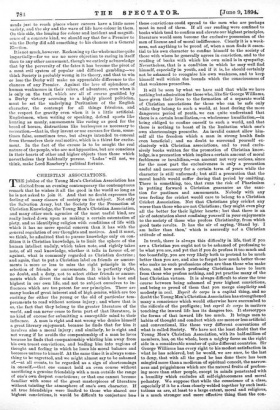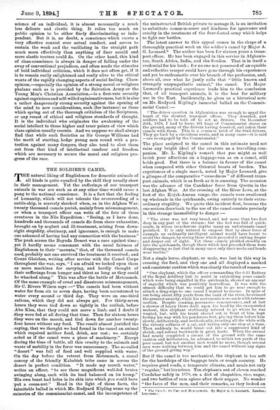CHRISTIAN ASSOCIATIONS.
THE jubilee of the Young Men's Christian Association has elicited from an evening contemporary the contemptuous remark that he wishes it all the good in the world so long as he is not asked to join it. And that no doubt expresses the feeling of many classes of society on the subject. Not only the Salvation Army, but the Society for the Promotion of Christian Knowledge, the Young Men's Christian Association, and many other such agencies of the most useful kind, are really looked down upon as making a certain ostentation of piety, and as identifying religion with conditions of life with which it has no more special concern than it has with the general regulation of our thoughts and motives. And it must, we think, be admitted that to pursue knowledge only on con- dition it is Christian knowledge, is to limit the sphere of the human intellect unduly, which takes note, and rightly takes note, of all real knowledge, whether it tells in favour of, or against, what is commonly regarded as Christian doctrine ; and again, that to put a Christian label on friends or amuse- ments is more or less to miss the right principle in the selection of friends or amusements. It is perfectly right, no doubt, and a duty, not to select either friends or amuse- ments which divert the mind from that which is best and highest in our own life, and not to subject ourselves to in- fluences which are too potent for our principles. There are many books of great interest and of high genius, which are too exciting for either the young or the old of particular tem- peraments to read without serious injury ; and where that is so, the fact that they belong to the greater literature of the world, and can never cease to form part of that literature, is no kind of excuse for submitting a susceptible mind to their influence. A man is right and not wrong who denies himself a great literary enjoyment, because he finds that for him it involves also a moral injury ; and similarly, he is right and not wrong if he avoids the companionship of a man he loves became he finds that companionship whirling him away from his own truest convictions, and leading him into regions of thought and feeling in which he loses his moral balance and becomes untrue to himself. At the same time it is always some- thing to be regretted, and we might almost say-to be ashamed of,—at all events, to be regarded as a sign of shortcomings in oneself,—that one cannot hold an even course without sacrificing a genuine friendship with a man outside the range of one's own deepest convictions; or that one cannot become familiar with some of the great masterpieces of literature without tainting the atmosphere of one's own character. If all true friendships were limited to those who shared our highest convictions, it would be difficult to conjecture how
these convictions could spread to the men who are perhaps most in need of them. If all our reading were confined to books which tend to confirm and elevate our highest principles, literature would soon become the exclusive possession of the men of license and of moral indifference. Clearly it is a weak- ness, not anything to be proud of, when a man finds it essen- tial to his own character to confine himself to the society of those with whom he generally agrees in conviction, and to the reading of books with which his own mind is in sympathy. Nevertheless, that is a condition in which he may well find himself, especially in youth, and if it is, he should certainly not be ashamed to recognise his own weakness, and to keep himself well within the bounds which the consciousness of that weakness prescribes.
It will be seen by what we have said that while we have nothing but admiration for those who, like Sir George Williams, have given their lives to the formation of a separate world of Christian associations for those who can be safe only while they belong to such a world, at least during the more dangerous period of youth, we can quite understand that there is a certain humiliation,—a wholesome humiliation,—in being obliged to confine oneself to such a world, and that there is nothing to boast of in the limitation which one's own shortcomings prescribe. An invalid cannot allow him- self all the freedom which a man in strong health finds even beneficial ; and no doubt to surround yourself ex- clusively with Christian associations, and to read exclu- sively books written for the promotion of Christian know- ledge, is a precaution which implies a certain amount of moral feebleness or invalidism,—an amount not very serious, since for the most part the exclusiveness is only a precaution useful and necessary for a certain term of years while the character is still unformed ; but still a precaution that the moral health would suffer during that period by omitting. There is something, too, that runs the risk of Pharisaisra in putting forward a Christian guarantee as the sanc- tion for pastimes and amusements. Nobody with any true feeling for cricket would care to belong to a Christian Cricket Association. Not that Christians play cricket any worse than those who are not Christians ; they might even play all the better for their lighter hearts ; but that there is an air of ostentation about confining yourself in your enjoyments to the society of those who profess Christianity, from which good taste revolts. It has the air of saying, Stand by. I am holier than thou,' which is assuredly not a Christian attitude of mind.
In truth, there is always this difficulty in life, that if you are a Christian you ought not to be ashamed of professing to be what you are, and yet that if you do profess it too much and too boastfully, you are very likely both to pretend to be much better than you are, and also to forget how much better those who make no such professions often are than those who make them, and how much professing Christians have to learn from those who profess nothing, and yet practise many of the beat Christian virtues. It is always difficult to steer the true course between being ashamed of your highest convictions, and being so proud of them that you merge simplicity and modesty in zeal. Esprit de corps is a capital thing, and no doubt the Young Men's Christian Association has strengthened many a conscience which would otherwise have succumbed to the ridicule of the profligate ; but esprit de corps in matters touching the inward life has its dangers too. It stereotypes the forms of that inward life too much. It brings men to habits of thought and conduct which are more or less artificial and conventional, like those very different conventions of what is called Society. We have not the least doubt that the Young Men's Christian Association, with its half-million of members, has, on the whole, been a mighty force on the right side in a considerable number of quite different countries. Sir George Williams has every right to his modest satisfaction in what he has achieved, but he would, we are sure, be the last to deny, that with all the good he has done there has been mingled more than a modicum of spiritual conceit, the narrow- ness and priggishness which are the natural fruits of profess- ing more than other people, except in minds penetrated with a humility which excludes all self-righteousness and moral pedantry. We suppose that while the conscience of a class, especially if it be a class closely welded together by such insti- tutions as are, at least to a large extent, moral and religious, is a much stronger and more effective thing than the con-
science of an individual, it is almost necessarily a much less delicate and elastic thing. It relies too much on public opinion to be either finely discriminating or inde- pendent. But it is, no doubt, a conscience which exerts a very effective control over actual conduct, and serves to sustain the weak and the vacillating in the straight path much more effectively than anything of finer mould and more elastic texture could do. On the other hand, this kind of class-conscience is always in danger of falling under the sway of conventional prejudices, and often needs the stimulus of bold individual criticism, which it does not often get, if it is to remain really enlightened and really alive to the ethical wants of the rapidly changing aspects of social feeling. Class- opinion,—especially the opinion of a strong moral or religious phalanx such as is provided by the Salvation Army or the Young Men's Christian Association,—is a first-rate security against capricious and self-willed opinionativeness, but it is also a rather dangerously strong security against the opening of the mind to new considerations, such (for instance) as those which spring out of the thorough criticism of the Scriptures, or any recast of ethical and religious standards of thought. It is the individual who originates the awakening of the aocial intellect to those higher and truer points of view which class-opinion usually resents. And we suppose we shall always find that while such Societies as Sir George Williams had the merit of starting, hedge young men round with a pro- tection against many dangers, they also tend to shut them -out from that kind of intellectual candour and freedom which are necessary to secure the moral and religious pro- gress of the race.







































 Previous page
Previous page